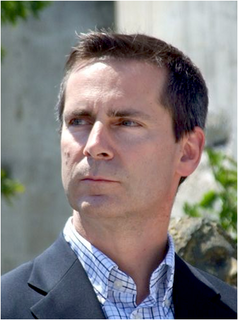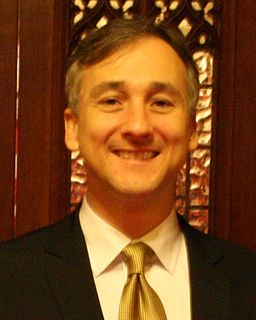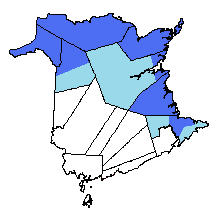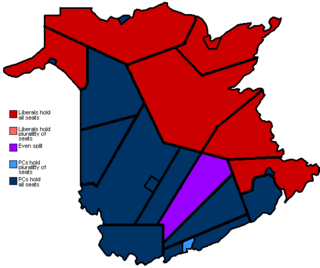

The 26th New Brunswick general election was held on October 23, 1967, to elect 58 members to the 46th New Brunswick Legislative Assembly, the governing house of the province of New Brunswick, Canada.

The provinces and territories of Canada are sub-national governments within the geographical areas of Canada under the authority of the Canadian Constitution. In the 1867 Canadian Confederation, three provinces of British North America—New Brunswick, Nova Scotia, and the Province of Canada —were united to form a federated colony, becoming a sovereign nation in the next century. Over its history, Canada's international borders have changed several times, and the country has grown from the original four provinces to the current ten provinces and three territories. Together, the provinces and territories make up the world's second-largest country by area.

New Brunswick is one of four Atlantic provinces on the east coast of Canada. According to the Constitution of Canada, New Brunswick is the only bilingual province. About two thirds of the population declare themselves anglophones and a third francophones. One third of the population describes themselves as bilingual. Atypically for Canada, only about half of the population lives in urban areas, mostly in Greater Moncton, Greater Saint John and the capital Fredericton.

Canada is a country in the northern part of North America. Its ten provinces and three territories extend from the Atlantic to the Pacific and northward into the Arctic Ocean, covering 9.98 million square kilometres, making it the world's second-largest country by total area. Canada's southern border with the United States, stretching some 8,891 kilometres (5,525 mi), is the world's longest bi-national land border. Its capital is Ottawa, and its three largest metropolitan areas are Toronto, Montreal, and Vancouver. As a whole, Canada is sparsely populated, the majority of its land area being dominated by forest and tundra. Consequently, its population is highly urbanized, with over 80 percent of its inhabitants concentrated in large and medium-sized cities, with 70% of citizens residing within 100 kilometres (62 mi) of the southern border. Canada's climate varies widely across its vast area, ranging from arctic weather in the north, to hot summers in the southern regions, with four distinct seasons.
The governing Liberal Party, under Premier Louis Robichaud, had just completed implementing its landmark Equal Opportunity program, which drastically improved government services in poorer and francophone regions of the province. Several Liberal cabinet ministers had quit politics during the previous term, including some who were uncomfortable with Robichaud's policies. Education minister Henry Irwin was fired after having an extramarital affair.

The New Brunswick Liberal Association, more popularly known as the New Brunswick Liberal Party or Liberal Party of New Brunswick, is one of the two major provincial political parties in New Brunswick, Canada. The party descended from both the Confederation Party and the Anti-Confederation Party whose members split into left-wing and right-wing groups following the creation of Canada as a nation in 1867.
Louis Joseph Robichaud,, popularly known as "Little Louis" or "P'tit-Louis", was the second Acadian Premier of New Brunswick, serving from 1960 to 1970.
The Equal Opportunity program in the Canadian province of New Brunswick was created to ensure equal services would be provided to citizens in all parts of the province regardless of the wealth in the area.
The Progressive Conservatives had selected Charlie Van Horne as leader in November 1966. Van Horne, whose cowboy hat had become his trademark to voters, had faced several lawsuits over his personal financial matters during the 1960s which caused him to sell his hotel in Campbellton, but claimed they had all been settled. Liberals claimed that industrialist K.C. Irving, who was in his own personal battle with Robichaud, was funding Van Horne's campaign. Conservatives were hopeful that Van Horne's charisma and speaking skills could surpass those of Robichaud.

The Progressive Conservative Party of New Brunswick is a centre-right, conservative political party in the Canadian province of New Brunswick. The party has its origins in the pre-Canadian confederation Conservative Party that opposed the granting of responsible government to the colony. It has historically followed the Red Tory tradition. The Progressive Conservative Party currently leads the provincial government since 2018 under Premier Blaine Higgs.

A hotel is an establishment that provides paid lodging on a short-term basis. Facilities provided may range from a modest-quality mattress in a small room to large suites with bigger, higher-quality beds, a dresser, a refrigerator and other kitchen facilities, upholstered chairs, a flat screen television, and en-suite bathrooms. Small, lower-priced hotels may offer only the most basic guest services and facilities. Larger, higher-priced hotels may provide additional guest facilities such as a swimming pool, business centre, childcare, conference and event facilities, tennis or basketball courts, gymnasium, restaurants, day spa, and social function services. Hotel rooms are usually numbered to allow guests to identify their room. Some boutique, high-end hotels have custom decorated rooms. Some hotels offer meals as part of a room and board arrangement. In the United Kingdom, a hotel is required by law to serve food and drinks to all guests within certain stated hours. In Japan, capsule hotels provide a tiny room suitable only for sleeping and shared bathroom facilities.

Campbellton is a city with a population of 6,883 (2016) in Restigouche County, New Brunswick, Canada.
During the campaign, critics accused Van Horne of being vague on his promises for "a new tomorrow". He had pledged to increase health care and education funding while reducing taxes, with no answer as to how it would be accomplished.
Questions arose as to the Conservative campaign's funding. He campaigned across the province in a Cadillac, while Don Messer, one of the most popular musicians in Atlantic Canada at the time, accompanied Van Horne at several campaign stops. However, Equal Opportunity was wildly unpopular in many Conservative strongholds and the Liberals had been perceived as arrogant. Polls showed a close race.

Cadillac is a division of the American automobile manufacturer General Motors (GM) that designs and builds luxury vehicles. Its major markets are the United States, Canada, and China. Cadillac vehicles are distributed in 34 additional markets worldwide. Cadillac automobiles are at the top of the luxury field within the United States. In 2017, Cadillac's U.S. sales were 156,440 vehicles and its global sales were 356,467 vehicles.
Donald Charles Frederick "Don" Messer was a Canadian musician, band leader, radio broadcaster, and defining icon of folk music during the 1960s. His CBC Television series Don Messer’s Jubilee (1959–69) featured Messer's down-east fiddle style and the "old-time" music of Don Messer and His Islanders, and was one of the most popular and enduring Canadian television programs of the 1960s. Messer was known as a shy fiddler, who preferred to have the other members of the band take the spotlight.
Robichaud campaigned under the slogan of "a responsible government". With the entire campaign focused on attacking Van Horne, he used a dramatic effect of listing all of the Conservatives' promises on paper and unfurling it across a room. In the final days of the campaign, two Toronto newspapers ran unflattering articles about Van Horne, to which he threatened to sue the authors. The Conservative reaction is believed to have turned the results decidedly in Robichaud's favour.
The New Brunswick New Democratic Party stood for the first time, having sat out of the 1963 election. Three candidates stood, all of whom ran in ridings in Northumberland County, none of whom were elected. [1]
The New Brunswick New Democratic Party is a social-democratic provincial political party in New Brunswick, Canada linked with the federal New Democratic Party (NDP).

Northumberland County is located in northeastern New Brunswick, Canada.
| New Brunswick general election, 1967 | |||
|---|---|---|---|
| Party | Leader | Seats | Pop Vote |
| New Brunswick Liberal Association | Louis Robichaud | 32 | 52.8% |
| Progressive Conservative Party of New Brunswick | Charles Van Horne | 26 | 47.1% |
| New Brunswick New Democratic Party | Jack Currie | 0 | 0.1% |









